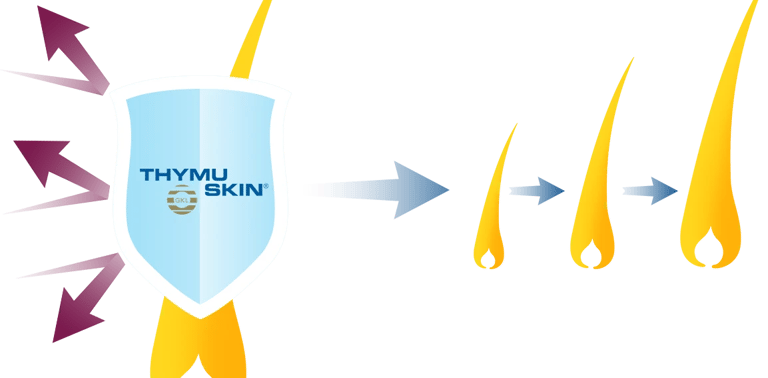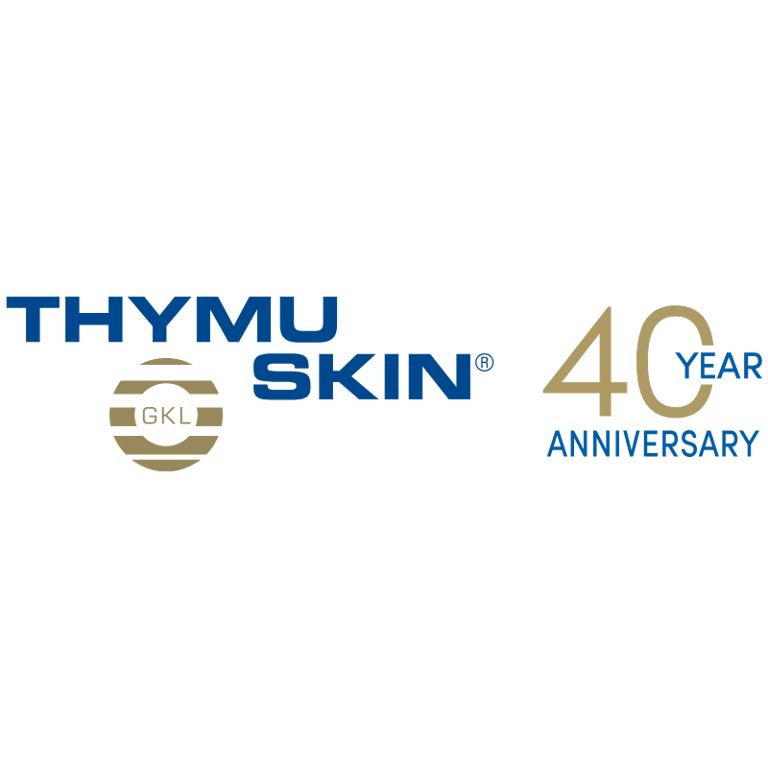Free Express Shipping on all orders with all duties included
How does THYMUSKIN® work?
Thymuskin has been successfully used for more than 40 years against hair loss and to promote new hair growth. The dermatological system works for both women and men and is very well tolerated.
Thymic peptide technology
The patented active ingredient complex called GKL-02 contained in Thymuskin consists of non-animal thymic peptides.
The biological activity of Thymuskin is particularly evident in the activation of the hair cells (keratinocytes), which have a decisive influence on the growth of the hair. Hair formation is stimulated.


Mode of action in hair growth disorders and hair loss
The thymus gland is an important organ of the lymphatic system. The thymus plays a special role in the immune system. It produces the T-lymphocytes that recognise foreign substances in the body, such as bacteria or viruses.
Research has shown that thymus peptides have a regenerating and strengthening influence on the upper structures of the scalp that surround the hair root and anchor the hair in the scalp.
100% free from animal ingredients - proven tolerability in women and men for 35 years.

Thymuskin contains mainly short-chain peptides, as they are also found in the natural thymus hydrolysate. Thanks to the process of controlled peptide synthesis, the ingredients can be produced in a consistently high quality. In over 40 years of application experience, the products are characterised by very good, dermatologically confirmed tolerability.
Depending on the preparation, the thymic peptide active ingredient GKL-02 is enriched with other auxiliary substances. It also contains plant proteins as well as vitamins B, E and F. In this way, Thymuskin products can be adapted to the different needs of the scalp and hair.
Thymuskin shows biological activity and empirical effectiveness
The thymic peptide active ingredient GKL-02 showed higher biological activity in the in-vitro test system than the natural starting product. The results of this study allow the selection of an economical application concentration of the thymic peptide active ingredient GKL-02, which is oriented towards the respective strengths of the hair loss.
The efficacy of Thymuskin in the various forms of hair loss has been confirmed in several clinical studies. The biological effectiveness depends on the sufficient concentration, the duration of application and the presence of intact hair follicles.
Independent study confirms efficacy hypothesis
An independent study has now analysed the cellular process of hair growth in more detail and found that the thymus peptide thymulin acts as a direct modulator of hair follicle growth. In laboratory experiments, the thymus peptide led to strikingly high growth rates in human hair follicles.
Thymulin fractions are, among other things, a component of the thymic peptide active ingredient GKL-02 and thus stimulate the hair formation process in Thymuskin Shampoo and Thymuskin Serum. Natural hair growth is supported.
* Meier N et al: Thymic Peptides Differentially Modulate Human Hair Follicle Growth. Journal of Investigative Dermatology (2012) 132, 1516-1519.
Clinically tested effectiveness
The positive effect of Thymuskin has been convincingly confirmed several times in scientific investigations and studies at skin and university clinics.
Overview of clinics where Thymuskin studies in the field of alopecia have been carried out:
Academic Teaching Hospital of the Universities of Frankfurt and Heidelberg
City Hospital of Vienna-Lainz, Austria
Ruprecht-Karls-University Heidelberg
University of Munster
Medical Academy Hannover
I. Medical Clinic and Polyclinic at the "Klinikum rechts der Isar" of the TU Munich (1988)
German Cancer Research Centre Heidelberg
Dermatology Unit, University of Milan, Italy
The company's own research in the pharmaceutical and cosmetic field began in 1976 and has launched numerous innovations and patents to date.
A dossier of clinical studies is available for professionals to view (info@thymuskin.de).
Source reference
Prof. Dr. M. Hagedorn, Hospital Darmstadt, 1991
Prof. Dr. M. Hagedorn, Hospital Darmstadt, 1993
Dr. Panoutsopoulou, Greece, 2020
Open application observation Thymuskin, Mannheim, 2018
Open application observation Thymuskin, Mannheim, 2017
Dr. Beck Heidelberg, 2019
Open application observation Thymuskin, Mannheim, 1991
Open application observation Thymuskin, Mannheim, 2019
Thymuskin
Save Your Hair
info@thymuskinuae.com
Phone: +971 4 3939 771
© 2026 Thymuskin®. All rights reserved.
Cell: +971 505 41 9616
